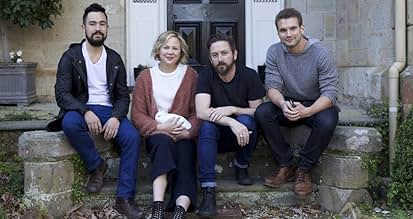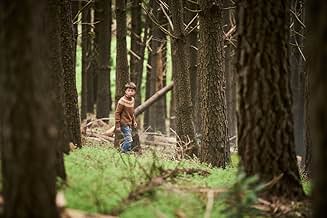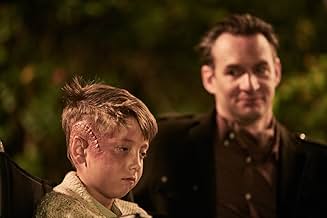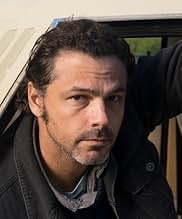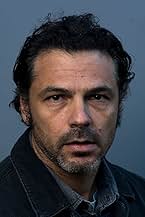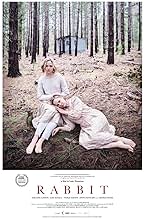Após um sonho vívido, Maude Ashton retorna a Adelaide, certa de que agora sabe o paradeiro de sua irmã gêmea desaparecida.Após um sonho vívido, Maude Ashton retorna a Adelaide, certa de que agora sabe o paradeiro de sua irmã gêmea desaparecida.Após um sonho vívido, Maude Ashton retorna a Adelaide, certa de que agora sabe o paradeiro de sua irmã gêmea desaparecida.
Avaliações em destaque
It's been almost a year after her identical twin's unsolved disappearance, medical student Maude Ashton, studying overseas, is still plagued by visions of her sister being violently abducted. She believes she's alive and knows her whereabouts, as these visions seem so real. So, she returns home, inspite of everyone believing her sister to be dead. She along with her sister's boyfriend and town cop who originally worked the case, follow the clues to a derelict caravan park. There she discovers her own fate is essentially linked by the special connection shared between the sisters.
Watching this independent Arthouse Aussie psychological teaser, had me like an anxious rabbit caught in the headlights. I was never too sure what to expect, and never did I truly grasp what was fully going on. And I don't know if you're meant too either? But it did linger on my mind, long after it finished. From beginning to end, it's very ponderous and ambiguously cryptic in what seemed at first like a straight-up, peculiar rural locals hiding secrets and cult themed story, yet it becomes experimentally deranged, not over-the-top crazy, but there's a whole lot more to it. Possibly a secret society (the council) watching on, pulling the strings. Bit by bit, the shrouded mystery surrounding the missing twin sister comes to fruition, we discover what happened and why her. Although the script never expanded on the bigger picture around these unusual circumstances, like the background of this driving force and the pay-off is rather muted when compared to how it's built-up. Everything that occurs is patterned on methodical and predetermined brushes, and character actions are basically on a collision course towards fate, which brews up all kinds of twisted emotions.
I guess it can be a frustrating experience, however I was caught in two minds. While the plot had me head-scratching, it was strangely unsettling, in spite of there being little in the way of incidents and heavy on atmospheric dread. After the film during the Q&A, debut writer/director (Luke Shanahan) mentioned he found the film to have a very bold, European vibe in moods, structure and pacing. This statement felt right on the money. It was a beautifully projected presentation with arresting, and unnerving imagery. Anna Howard's percise and particular positional framing shoots up from the screen and her sweeping cinematography of the Adelaide country locations was a tool to show the stifling elements of its surroundings in hiding the truth. It's easy to get lost out there, never to be found again. So a great place to bury the truth. Even the music score gets on the act. One minute it's underplayed - then it's laid on thick with overpowering, one-note brooding synthesisers. During the quiet moments, all hell would break loose, not on screen, but when the score erupted, adding a real bombastic intensity. As for the performances, the cast were excpetional. Adelaide Clemens' emotionally tapered, dogged performance as Ashton carries you along and Verrle Baetens' mysteriously cold-shouldered performance draws you into the meticulous web.
I really want to see this one again, as I think you need a second viewing to fully soak it up and comprehend what you just experienced.
Watching this independent Arthouse Aussie psychological teaser, had me like an anxious rabbit caught in the headlights. I was never too sure what to expect, and never did I truly grasp what was fully going on. And I don't know if you're meant too either? But it did linger on my mind, long after it finished. From beginning to end, it's very ponderous and ambiguously cryptic in what seemed at first like a straight-up, peculiar rural locals hiding secrets and cult themed story, yet it becomes experimentally deranged, not over-the-top crazy, but there's a whole lot more to it. Possibly a secret society (the council) watching on, pulling the strings. Bit by bit, the shrouded mystery surrounding the missing twin sister comes to fruition, we discover what happened and why her. Although the script never expanded on the bigger picture around these unusual circumstances, like the background of this driving force and the pay-off is rather muted when compared to how it's built-up. Everything that occurs is patterned on methodical and predetermined brushes, and character actions are basically on a collision course towards fate, which brews up all kinds of twisted emotions.
I guess it can be a frustrating experience, however I was caught in two minds. While the plot had me head-scratching, it was strangely unsettling, in spite of there being little in the way of incidents and heavy on atmospheric dread. After the film during the Q&A, debut writer/director (Luke Shanahan) mentioned he found the film to have a very bold, European vibe in moods, structure and pacing. This statement felt right on the money. It was a beautifully projected presentation with arresting, and unnerving imagery. Anna Howard's percise and particular positional framing shoots up from the screen and her sweeping cinematography of the Adelaide country locations was a tool to show the stifling elements of its surroundings in hiding the truth. It's easy to get lost out there, never to be found again. So a great place to bury the truth. Even the music score gets on the act. One minute it's underplayed - then it's laid on thick with overpowering, one-note brooding synthesisers. During the quiet moments, all hell would break loose, not on screen, but when the score erupted, adding a real bombastic intensity. As for the performances, the cast were excpetional. Adelaide Clemens' emotionally tapered, dogged performance as Ashton carries you along and Verrle Baetens' mysteriously cold-shouldered performance draws you into the meticulous web.
I really want to see this one again, as I think you need a second viewing to fully soak it up and comprehend what you just experienced.
So let me first start off by saying I did enjoy the movie for the most part. The ending sucked because I felt like we had not gotten any real answers to any questions we had, if not it just added more to the pile. The atmosphere was creepy, there was definitely a deep mystery involved, and there was decent shots with interesting locations. But I'm so frustrated I never really got to fully understand the story. There's was definitely alot of things the directors should've filled in as far as gaps go because it just felt incomplete. I'm not sure if they were just trying to be mysterious and whatnot or couldn't figure out a decent ending but it literally made no sense. It's a decent movie but you will be frustrated. And if your sensitive to children getting hurt (which I am) your not going to like this movie. There's alot of experiments and surgeries going on with children and young adults, most of which aren't seen but the after effects are and its hard to watch.
Acting was good, cinematography was good, story could have been presented better. The soundtrack was intense in the wrong places and there was a terrible version of "White Rabbit" at the end.
Rabbit could have and should have been a really good thriller come may be, horror story. But pacing, narrative and inconsistent character development mitigate against that possibility ever occurring.
The movie is held together by a compelling central performance from Adelaide Clemens playing identical twins Maude and Cleo. The rest of the cast is very good too, but Clemens shines. It's notable that the film begins to drag more in the second half, when curiously, the focus shifts away for some time, from her character(s).
The cinematography, highlighting locations around south eastern South Australia, not often seen in Australian films, is also first class.
The music mirrors the storyline, in its unevenness. Appropriately foreboding much of the time, but strangely whimsical at odd moments.
My main issues with the film lie in the narrative. Why in the production notes/plot summary immediately reveal the existence of "the Council"? Surely that story point, derivative though it may be, needed to be held back to build, rather than erode suspense. What exactly was the German connection to The Council? Surely this needed more illumination. Australian Maude returns from some time studying overseas in Germany to search for her twin. The Council clearly has some sort of German heritage which is demonstrated frequently in the film's second half ... but so what? We're never given any more information.
The character of Henry the ex(?) detective is never given any real back story, though he features quite heavily in the film's first half. Why is he so obsessed with the case of missing Cleo? He says he is. But crucially the audience is never given any real reasons/evidence for him just joining Maude on her quest at the expense of every thing else. Similarly, in the film's second half, why does so much of the action start to focus on the character of Nerida, when she is just about unseen in the first half. Yes, she is German, involved with the Council and may have had a twin herself, but again, so what? It's almost like director Luke Shanahan, felt he had to give greater prominence to experienced Belgian actress Veerle Baetens, who is undeniably good in the role.
The film's conclusion when it finally arrives, heralds one of those "is that all there is?" occasions, as the final frames mirror those of the movie's opening.
The film's producers were obviously hoping to recreate a rurally-derived Rosemary's Baby type scenario, under the Southern Cross. They only succeeded in creating a rather muted, ambiguously defined off-shoot.
The movie is held together by a compelling central performance from Adelaide Clemens playing identical twins Maude and Cleo. The rest of the cast is very good too, but Clemens shines. It's notable that the film begins to drag more in the second half, when curiously, the focus shifts away for some time, from her character(s).
The cinematography, highlighting locations around south eastern South Australia, not often seen in Australian films, is also first class.
The music mirrors the storyline, in its unevenness. Appropriately foreboding much of the time, but strangely whimsical at odd moments.
My main issues with the film lie in the narrative. Why in the production notes/plot summary immediately reveal the existence of "the Council"? Surely that story point, derivative though it may be, needed to be held back to build, rather than erode suspense. What exactly was the German connection to The Council? Surely this needed more illumination. Australian Maude returns from some time studying overseas in Germany to search for her twin. The Council clearly has some sort of German heritage which is demonstrated frequently in the film's second half ... but so what? We're never given any more information.
The character of Henry the ex(?) detective is never given any real back story, though he features quite heavily in the film's first half. Why is he so obsessed with the case of missing Cleo? He says he is. But crucially the audience is never given any real reasons/evidence for him just joining Maude on her quest at the expense of every thing else. Similarly, in the film's second half, why does so much of the action start to focus on the character of Nerida, when she is just about unseen in the first half. Yes, she is German, involved with the Council and may have had a twin herself, but again, so what? It's almost like director Luke Shanahan, felt he had to give greater prominence to experienced Belgian actress Veerle Baetens, who is undeniably good in the role.
The film's conclusion when it finally arrives, heralds one of those "is that all there is?" occasions, as the final frames mirror those of the movie's opening.
The film's producers were obviously hoping to recreate a rurally-derived Rosemary's Baby type scenario, under the Southern Cross. They only succeeded in creating a rather muted, ambiguously defined off-shoot.
Medical student Maude Ashton (Adelaide Clemens) is haunted by her missing twin sister Cleo. She has a breakdown and returns home to Adelaide. Her investigation uncovers a conspiracy.
Nothing nothing nothing nothing oh hey something interesting the end. This has an interesting second half but it's too bad that one has to sit through a lot of nothing to get to it. The first half is way too slow. This could be an interesting Twilight Zone episode if it cut out half a movie. Most people would abandon this long before then.
Nothing nothing nothing nothing oh hey something interesting the end. This has an interesting second half but it's too bad that one has to sit through a lot of nothing to get to it. The first half is way too slow. This could be an interesting Twilight Zone episode if it cut out half a movie. Most people would abandon this long before then.
Você sabia?
- CuriosidadesThe World Premiere was held at the 66th Melbourne International Film Festival on 5th August 2017.
- ConexõesFeatured in The Story of Rabbit (2018)
Principais escolhas
Faça login para avaliar e ver a lista de recomendações personalizadas
- How long is Rabbit?Fornecido pela Alexa
Detalhes
Bilheteria
- Orçamento
- AU$ 3.000.000 (estimativa)
- Tempo de duração
- 1 h 43 min(103 min)
- Cor
- Proporção
- 2.35 : 1
Contribua para esta página
Sugerir uma alteração ou adicionar conteúdo ausente


